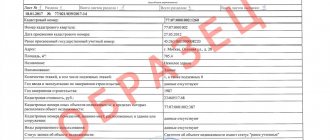What documents does the housing company have the right to demand from the apartment owner?
I bought an apartment in a new building. Now the housing company requires all residents (owners of apartments) of a new building to fill out forms indicating all the data on the apartment’s ownership certificate and indicating the passport details of the apartment owner.
Does the housing company have the right to demand such data?
December 14, 2013, 14:40, question No. 326786 Julia, Yekaterinburg
- , , , , , , , , , ,
300 cost of the issueissue resolved Collapse Online legal consultation Response on the website within 15 minutes Answers from lawyers (6) 33% fee received 542 answers 262 reviews Chat Free assessment of your situation Lawyer, city.
Tomsk Free assessment of your situation Hello, Julia! Depending on why such a form is being filled out. Confirmation of ownership of an apartment is a certificate of registration of title. Confirmation of your identity is a passport of a citizen of the Russian Federation. Thus, after filling out the data on the certificate of ownership and your passport data, your housing company will establish that you are the owner of a specific apartment. Thus, after filling out the data on the certificate of ownership and your passport data, your housing company will establish that you are the owner of a specific apartment. As a rule, such data is filled in on voting sheets at a general meeting of owners of a residential building in the form of absentee voting.
If such data is not filled in, it will not be possible to establish the legality of the meeting, since it will not be established whether you are the owner and whether you had the right to take part in the vote. Ballots that are not completed or not filled out in full will not be included in the vote count.
In addition, the same data is necessary for the housing company to conclude a management agreement or a residential building maintenance agreement with you.
Therefore, I don’t see anything criminal in the housing company’s demand to confirm your powers and rights regarding the apartment you own.
December 14, 2013, 14:47 1 0 fee received 42% 14512 replies 5979 reviews Chat Free assessment of your situation Murashko Vladimir Lawyer, Krasnodar Free assessment of your situation
- 5979 reviews
- 14512 replies
Hello Julia!
The housing complex has the right to demand data from the certificate of ownership of the apartment. It is better to give them a photocopy of this document. They need this document in order to know who exactly is the owner of the property, to whom to charge fees for utilities, etc.
As for your passport data, the law does not prohibit the presentation of this data by the owner of the property to the housing company, but it does not oblige it either.
Therefore, you have the right not to give them your passport information. For them, the data contained in the certificate of ownership is sufficient.
December 14, 2013, 2:49 pm 2 0 19621 replies 7800 reviews expert Chat Free assessment of your situation Lawyer,
Stavropol Free assessment of your situation
- expert
Hello!
Yes, you have the right. And this is applied in practice. Most often, they request a copy of the certificate of ownership in order to open a personal account for you to pay for services and to vote on the use and management of the common property of the house. Good luck! December 14, 2013, 14:57 1 0 25% fee received 1538 replies 1074 reviews Chat Free assessment of your situation Ivanov Sergey Lawyer,
Good luck! December 14, 2013, 14:57 1 0 25% fee received 1538 replies 1074 reviews Chat Free assessment of your situation Ivanov Sergey Lawyer, Orenburg Free assessment of your situation
- 1538 replies
- 1074 reviews
The management company has the right to demand such documents only if it was elected at a general meeting of homeowners as a residential complex. Very often, in practice, several companies fight among themselves and try to obtain documents before the general meeting and retroactively draw up a protocol on the election of the residential complex as the management company for this house.
Ask the representatives of the residential complex for the Minutes of the general meeting of residents on the choice of the management company - if it is available, you can show all the documents after concluding the Agreement on the management of an apartment building. December 14, 2013, 16:01 0 0 2822 responses 657 reviews Chat Free assessment of your situation Lawyer, Moscow Free assessment of your situation Hello Yulia!
Relations related to the processing of personal data carried out by legal entities and individuals using automation tools, including in information and telecommunication networks, or without the use of such means, if the processing of personal data without the use of such means corresponds to the nature of the actions (operations) performed with personal data using automation tools, or other systematized collections of personal data, and (or) access to such personal data is regulated by Federal Law dated July 27, 2006 N 152-FZ (as amended on July 23, 2013) “On Personal Data.” According to Art. 3 and Article 6 of the Law basic concepts: 1) personal data - any information relating directly or indirectly to a specific or identifiable individual (subject of personal data); 2) operator - a state body, municipal body, legal entity or individual, independently or jointly with other persons organizing and (or) carrying out the processing of personal data, as well as determining the purposes of processing personal data, the composition of personal data to be processed, actions (operations) performed with personal data data; 3) processing of personal data - any action (operation) or set of actions (operations) performed using automation tools or without the use of such means with personal data, including collection, recording, systematization, accumulation, storage, clarification (updating, changing), extraction, use, transfer (distribution, provision, access), depersonalization, blocking, deletion, destruction of personal data; 6) provision of personal data - actions aimed at disclosing personal data to a certain person or a certain circle of persons; Processing of personal data must be carried out in compliance with the principles and rules provided for by this Federal Law. Processing of personal data is permitted in the following cases: 1) processing of personal data is carried out with the consent of the subject of personal data to the processing of his personal data; 5) the processing of personal data is necessary for the execution of an agreement to which the subject of personal data is a party or beneficiary or guarantor, as well as for concluding an agreement on the initiative of the subject of personal data or an agreement under which the subject of personal data will be a beneficiary or guarantor; 7) the processing of personal data is necessary to exercise the rights and legitimate interests of the operator or third parties or to achieve socially significant goals, provided that the rights and freedoms of the subject of personal data are not violated; The operator has the right to entrust the processing of personal data to another person with the consent of the subject of personal data, unless otherwise provided by federal law, on the basis of an agreement concluded with this person, that is, the provision of any information relating to you directly or indirectly to a legal entity or individual (Criminal Code, Housing Office.), carried out in the above and other cases in compliance with the requirements of this law.
According to Article 9 and Article 14 of the Law, the Personal Data Subject decides to provide his personal data and consents to their processing freely, of his own free will and in his own interest. Consent to the processing of personal data must be specific, informed and conscious. Consent to the processing of personal data can be given by the subject of personal data or his representative in any form that allows confirmation of the fact of its receipt, unless otherwise provided by federal law.
If consent to the processing of personal data is obtained from a representative of the personal data subject, the authority of this representative to give consent on behalf of the personal data subject is verified by the operator. Consent to the processing of personal data may be revoked by the subject of personal data.
If the subject of personal data withdraws consent to the processing of personal data, the operator has the right to continue processing personal data without the consent of the subject of personal data if there are grounds specified in paragraphs 2 - 11 of part 1 of Article 6, part 2 of Article 10 and part 2 of Article 11 of this Federal Law. The obligation to provide evidence of obtaining the consent of the personal data subject to the processing of his personal data or evidence of the existence of the grounds specified in paragraphs 2 - 11 of part 1 of Article 6, part 2 of Article 10 and part 2 of Article 11 of this Federal Law rests with the operator.
The subject of personal data has the right to receive the information specified in part 7 of this article, except for the cases provided for in part 8 of this article.
We recommend reading: Application for registration in an apartment sample
The subject of personal data has the right to demand from the operator clarification of his personal data, blocking or destruction of it if the personal data is incomplete, outdated, inaccurate, illegally obtained or is not necessary for the stated purpose of processing, as well as take measures provided by law to protect his rights. That is, the processing of your personal data is permitted only with your consent, which must be explicit. In this case, you have the right to withdraw your consent and also demand the destruction of your data.
Therefore, you have the right not to comply with the requirements of the Criminal Code.
By virtue of Article 17 and Article 24 of the Law, if the subject of personal data believes that the operator is processing his personal data in violation of the requirements of this Federal Law or otherwise violates his rights and freedoms, the subject of personal data has the right to appeal the actions or inaction of the operator to the authorized body for the protection of rights subjects of personal data or in court.
2. The subject of personal data has the right to protect his rights and legitimate interests, including compensation for losses and (or) compensation for moral damage in court.
Persons guilty of violating the requirements of this Federal Law bear responsibility as provided for by the legislation of the Russian Federation. Moral damage caused to the subject of personal data as a result of violation of his rights, violation of the rules for processing personal data established by this Federal Law, as well as requirements for the protection of personal data established in accordance with this Federal Law, is subject to compensation in accordance with the legislation of the Russian Federation.
Moral damage caused to the subject of personal data as a result of violation of his rights, violation of the rules for processing personal data established by this Federal Law, as well as requirements for the protection of personal data established in accordance with this Federal Law, is subject to compensation in accordance with the legislation of the Russian Federation. Compensation for moral damage is carried out regardless of compensation for property damage and losses incurred by the subject of personal data.
That is, if the management company (another person) violates your legal rights, including the deletion of data, then you have the right to file a written complaint with the authorized body and, if necessary, with the court. If the processing of personal data is necessary for the execution of an agreement with a management company, to which you are a party or initiator as the owner, then the management company has the right to receive your data.
Thus, now you should receive an explanation from the Criminal Code for what purposes the survey is being carried out and make your decision. I can add. provide advice on resolving disputes with the management company via chat.
Sincerely, F. Tamara December 15, 2013, 02:15 0 0 449 replies 110 reviews Chat Free assessment of your situation Lawyer, Moscow Free assessment of your situation Yulia Good evening!!!
Anyone can demand something, but the question is usually different: Are we obligated to provide what is required??? In this case, you need to understand why they need it and how it fits with YOUR interests???
If you have some kind of relationship with the housing complex, then carefully study the document that binds you - perhaps you have undertaken an obligation to provide it to them. If nothing connects you with them, then they themselves will be able to obtain information about the owners of apartments in this building. But it will cost them some money because...
how Rosreestr provides such data for money. Perhaps they just decided to save money.
This data can be ordered officially through the Rosreestr website, including you can order - it costs about 200 rubles. Study everything carefully and consider how it may affect your interests. And decide whether you should make their life easier or not, let them pay!!!!
With all respect, Andrew. December 15, 2013, 19:04 0 0 All legal services in Moscow Best price guarantee - we negotiate with lawyers in every city on the best price.
Similar questions 03 March 2020, 12:53, question No. 2703432 05 February 2020, 17:45, question No. 2249785 27 March 2020, 11:26, question No. 1947774 08 October 2020, 16:42, question No. 2128140 25 October 2020, 13:27, question No. 1419473 See also
There is a lot of evidence, namely extracts from the register of municipal property in the regions (we will also request them), from which it is clear that the common property of the house does not belong to the residents of the house, it is the property of the state or municipality . And as we have already said, the owners must pay for it. Not users, the word “users” is never found anywhere in the legislation, but rather owners. The people who live in the house, that is, you and me, are not the owners of this property, that is, they are not obliged to pay for it. And now many are faced with such a problem that municipalities have stopped issuing these extracts, since they remove all questions about the owner, that is, the payer.
In accordance with the Decree of the Government of the Russian Federation No. 1301 “On state accounting of the housing stock of Russia” dated October 13, 1997, technical accounting of the housing stock is assigned to municipal technical inventory bureaus (BTI), and as the practice of the constituent entities of the Russian Federation has shown, information about the owners of non-residential real estate objects confirms that that the owners of common property are municipalities.
Many people believe that if the common property is not listed in the certificate of registration of rights, perhaps there is some other document, for example, another certificate where it is indicated. Or it is automatically attached to the purchased apartment. Let's see what the legislation says about this.
There is Federal Law No. 122 , which is called “On state registration of rights to real estate and transactions with it,” in which all this is clearly stated. It contains article 2 . The concept of state registration of rights to real estate and transactions with it. In particular, the concept of state registration is spelled out there.
State registration of rights to real estate and transactions with it (hereinafter also referred to as state registration of rights) is a legal act of recognition and confirmation by the state of the emergence, limitation (encumbrance), transfer or termination of rights to real estate in accordance with the Civil Code of the Russian Federation.
State registration is the only evidence of the existence of a registered right. The registered right to real estate can only be challenged in court.
State registration of rights is carried out throughout the Russian Federation according to the system established by this Federal Law of records of rights to each object of real estate in the Unified State Register of Rights to Real Estate and Transactions with It.
That is, registration of rights can only be carried out through making an entry in the Unified State Register of Rights (USRE). Accordingly, there cannot be any “automatically”. Because the law clearly states the only way to register a right - making an entry in the Unified State Register, there is no other option. All questions about what belongs to us or what does not belong to us can be easily resolved by contacting this unified state register.
The date of state registration of rights is the day the corresponding records of rights are made in the Unified State Register of Rights.
Automatically, that is, simply on the basis of a certificate of ownership of the apartment, the common property cannot be transferred to the owner of the residential premises. It, just like real estate, must be properly registered. The relevant articles of the Housing Code, in particular Article 30, are declarative. It is there, but it doesn't work. She simply states that the owner of the residential premises bears the burden of maintaining the common property.
Of course, he carries it, this is not discussed. But before bearing this burden, it must be properly formalized and registered. Complete the procedures that we talked about earlier. And the transfer of ownership occurs only through registration and nothing else. Registration, in turn, occurs by making an entry in the Unified State Register of Rights (USRE). And while this record does not exist, we do not own any common property.
Article 38 of the Housing Code . Acquisition of a share in the right of common ownership of common property in an apartment building when purchasing premises in such a building.
When purchasing premises in an apartment building, the acquirer receives a share in the right of common ownership of the common property in the apartment building.
This article is very important; administrations, criminal codes, and other organizations very often refer to it, claiming that ownership rights are supposedly transferred to the citizen automatically, because this procedure is prescribed in the first part of the article. But. There is also part 2 , which is very often kept silent.
The terms of the agreement by which the transfer of ownership of premises in an apartment building is not accompanied by the transfer of a share in the right of common ownership of the common property in such a house are void.
If we have not registered the right to common property, then the terms of the agreement that accompanies the transfer of common property are void. This is stated in the legislation. And we have already said that registration with us occurs in one single way - by making an entry in the Unified State Register. The point of the entire article is that if we did not have this registration, there was no transfer of ownership, then the entire transaction is void in terms of the fact that you must maintain the common property.
There is one more important point. In order to register ownership of something, for example, a piece of real estate, common property or land, you must submit documents to the Unified State Register. This relates to the fact that it is not transmitted automatically. This is also specified in the legislation. There is instruction No. 29 “On the peculiarities of making entries in the Unified State Register . And there is chapter 2, part 6 .
6. Submission of documents for state registration of the right of common shared ownership of real estate objects is carried out in accordance with the Registration Law (including articles 16, 17 and 18 of the Registration Law).
Applications for state registration of the right of common shared ownership of real estate, restrictions (encumbrances) of this right may be submitted:
owners of premises in an apartment building;
You yourself must submit documents to have the common property transferred to your ownership.
representatives of the owners of premises in an apartment building, if this right is granted to them on the basis of duly executed powers of attorney, by a decision of the general meeting of owners, or on other grounds in accordance with the law.
If by decision of the general meeting of members of the homeowners association (hereinafter referred to as the HOA), the chairman and (or) other member of the HOA board is instructed to represent the interests of the HOA members when registering the presence, occurrence, limitation (encumbrance), termination of the right of common shared ownership of real estate (including submit applications for state registration), then these powers are confirmed by these persons submitting the charter of the HOA (original or notarized copy), a document on the election of the person to whom this right is granted as chairman, member of the board of the HOA, the relevant minutes of the general meeting of members of the HOA (original or notarized copy).
That is, these rights could be registered either by you, or by your representative, or by the chairman of the HOA. In order for someone to register common property as your property, he had to receive a notarized power of attorney from you. If you did not issue such a power of attorney to anyone, it means that no one could register this property in your name.
Now let's evaluate the possibility of existence of a separate certificate of registration of the right to common property. We read Resolution No. 219 “On approval of the rules for maintaining a unified state register of rights to real estate and transactions with it . There is paragraph 74 , which says:
Certificates of state registration of rights to real estate objects that are common property in an apartment building are not issued to owners of premises in an apartment building. Information on the state registration of the right of common shared ownership of real estate objects that are common property in an apartment building is included in the certificate of state registration of the right issued to the owner of the premises in an apartment building by means of an additional description in it of the named real estate objects and an indication of the size of the share in the right of common ownership of the property. this is property.
This is a very important point. The legislation clearly states that separate certificates for common property are not issued .
Therefore, look again at the certificate of registration of rights, which was issued either as a result of privatization or as a result of a purchase and sale transaction. According to the law, it must describe the common property with an indication of the size of the share. If there is no such record, you do not have this property, no matter who tells you. Because certificates of ownership are issued only on the basis of entering data into the Unified State Register. The same applies to cases where there is no certificate of registration of rights, but there is an agreement. The certificate must be required. It confirms your ownership of your property.
The mentioned Resolution No. 219 was in force until 01/01/2015. feel free to refer to it if your apartment was registered as a property before January 1, 2020. Now it has been cancelled, and instead it is replaced by Order No. 765 of the Ministry of Economic Development of Russia dated December 23, 2013, which is similar to this Resolution. It contains paragraph 156, this is an analogue of paragraph 74. If you register ownership of real estate now, refer to this document. By the way, it contains paragraph 163, it describes in great detail what documents are needed to register a right and how they are filled out, what you must indicate and why, and also provides forms to fill out. Please take it and use it.
Svetlana Shevchenko, Alexander Belanovsky
Tags: property, VAT
- 44-FZ VAT NDFL advance car alimony business marriage money children contract housing housing estate will land plot property lawsuit apartment contract benefit medicine management motivation tax taxes inheritance clothing pensions pension payments purchase allowance bonus crime trial psychology work advertising deal family court tender labor accounting school
We greatly appreciate your comments. Thank you!
Comments for the site
Cackl e
Free question for lawyers online
If you find it difficult to formulate a question, call, a lawyer will help you: Free from mobile and landline Free multi-channel phone If you find it difficult to formulate a question, call a free multi-channel phone, a lawyer will help you Subscribe to notifications Mobile application We are on social media. networks
© 2000-2020 Legal social network 9111.ru *A response to a question within 5 minutes is guaranteed to the authors of VIP questions. Moscow Komsomolsky pr., 7 St. Petersburg emb.
R. Fontanki, 59 Ekaterinburg: Nizhny Novgorod: Rostov-on-Don: Kazan: Chelyabinsk:
Grounds for the emergence of property rights to real estate
Since an apartment can be obtained in several ways, there may be several reasons.
Documents providing the basis for the emergence of ownership of an apartment (title documents) can be:
- Agreement for the transfer of ownership of housing (if the apartment was);
- Donation agreement (if);
- Sales and purchase agreement, or exchange agreement (if the apartment was purchased on);
- Agreement with the Developer, or Agreement on assignment of rights of claim (if the apartment was purchased on);
- Sales and purchase agreement and mortgage (if the apartment was purchased with borrowed funds from the bank);
- Court decision (if the property of spouses, heirs or other claimants was divided by court);
- Certificate of right to inheritance (if);
- Lifetime maintenance agreement with dependents (if the apartment was received under).
- Certificate of paid share (if);
- Agreement on division of property (if the apartment was obtained as a result of voluntary division);
Each such document shows the Buyer in which area of law one should look for answers to questions about the “legal purity” of the apartment.
VIDEO: Document establishing ownership of an apartment - What is a title document for an apartment?
What are the types of title documents?
Depending on which document served as the basis for obtaining ownership rights, the method of checking the remaining documents and identifying possible ones is chosen.
How the Buyer can check these documents is described in detail in our INSTRUCTIONS. “SECRETS OF A REALTOR”: A detailed algorithm of actions when buying and selling an apartment is presented in the interactive map (will open in a pop-up window).
From what moment does the right of ownership of residential premises arise?
29.1. The transfer of ownership of real estate is subject to state registration (Article 131 of the Civil Code of the Russian Federation). In accordance with Article 223 of the Civil Code of the Russian Federation, in cases where the alienation of property is subject to state registration, the acquirer’s right of ownership arises from the moment of such registration.
Best regards, did the answer help you? Yes No 29.2. The right of ownership arises from the moment of receipt of title documents, depending on the basis on which the property was transferred. Thus, when transferring ownership rights under a purchase and sale agreement - from the moment of registration of the agreement with the registration authority at the location of the premises (all real estate transactions are subject to mandatory state registration).
Best regards, did the answer help you? Not really
Who are the hidden owners in an apartment or house?
What does hidden owner mean? This term in housing legislation refers to third parties who have the right to part of the property or to reside/register in it. Who could it be:
- Owner's legal spouse
According to the law, regardless of which spouse is the owner of the property, both have the right to dispose of the property acquired during the marriage. That is why before the sale of any real estate, the notarized consent of the second spouse to the purchase and sale transaction is required. If there is no such power of attorney, the second spouse will be able to claim his rights to part of the property after registration of the transaction, which will lead to its cancellation.
It is necessary to require such consent even if the spouses are already divorced and do not live together. This does not matter if the apartment was purchased during marriage.
- Other heirs
Very often, owners sell housing that they inherited. In this case, the spouse has no right to part of the property. However, other heirs may appear and present their rights. The legal subtleties of registration in this case will depend on how exactly the seller received the apartment.
If the inheritance took place according to a will, and the original is in hand, then no problems will arise - this document determines the order of inheritance and excludes other applicants for the apartment.
If there was no will, and the housing went to the seller by law, then in the future it may turn out that someone else is laying claim to it. For example, all children inherit the parents’ apartment in equal shares, unless otherwise stated in the will. To prevent possible problems in this and other cases, it is recommended to add an additional clause to the purchase and sale agreement and stipulate in it that if other heirs are announced, the seller will solve all financial problems with them personally and transfer to them the portion of the funds received from the sale of the home that is required by law .
However, even in this case, think carefully about whether it is worth getting involved with the inherited apartments, especially if little time has passed since the inheritance. The purchase and sale agreement may violate the rights of the incapacitated parents, spouses, dependents, or minor children of the heir. This means it can be cancelled. In most cases, the owners themselves know about this, which is why they rush to sell, even by lowering the price of the property.
- Incapacitated citizens and minors registered in the apartment
If we are talking about minors, then the guardianship authorities must give permission for their removal from the housing being sold. Or the children must first be registered in another housing, and only after that they must be registered with the seller. If minors go to an orphanage or other government institution for permanent stay, they retain their share in the parents’ apartment. The same applies to persons dependent on the seller.
- Other persons registered in the apartment
If a person is in military service or in prison, he retains the right to live in an apartment. For example, a citizen who received a criminal record in 1995 or later was registered in the housing. Then he was discharged while in prison, after which the apartment was privatized and sold. But after returning, such a person has the legal right to register in the apartment again and move in there to live. The former owner of the apartment will seem to be out of business, since such a person does not have the right to part of the money from the sale. But it retains the right to live in it, no matter who is considered its owner.
The situation is similar with persons who left for military service in the army. Even if the housing was sold during their absence, they have the right to restore their registration and move into the apartment.
If a missing citizen was registered in the apartment, then he will be able to lay claim to it if he suddenly turns up. That is why it is recommended to check the history of all registrations and the fate of previously registered ones - to find out whether they are now registered elsewhere or not.
I am the owner of the apartment, based on the purchase and sale agreement.
According to the purchase and sale agreement, the previous owners, the sellers, were obliged to “vacate the specified apartment and transfer it to the buyer free from the rights and claims of third parties within 1 month, counting from the date of state registration in the Office of the Federal Registration Service for Moscow, and also withdraw from registration records within 10 (ten) days counting from the date of state registration in the Office of the Federal Registration Service for Moscow.”
However, a year after the sale, their pensioner mother remains registered in the apartment (she was not the owner, she transferred her share to one of her sons under a deed of gift even before the transaction) and has now begun to try to challenge the sale of the apartment, writing statements to the police and the prosecutor’s office (on in fact, they are already senile, they are transferred to the archive there).
The one to whom she gave her share, after selling the apartment, provided her with a separate one-room apartment, which she now does not want to live in (although she was happy with everything before the deal). I filed a claim under Article 292 of the Civil Code (the transfer of ownership of a residential building or apartment to another person is the basis for family members of the previous owner) and Article 35 of the Housing Code (in the event of termination of a citizen on the grounds provided for by the Housing Code of the Russian Federation, other federal laws, an agreement, or on the basis of a court decision, this citizen is obliged to vacate the relevant residential premises.
I filed a claim under Article 292 of the Civil Code (the transfer of ownership of a residential building or apartment to another person is the basis for family members of the previous owner) and Article 35 of the Housing Code (in the event of termination of a citizen on the grounds provided for by the Housing Code of the Russian Federation, other federal laws, an agreement, or on the basis of a court decision, this citizen is obliged to vacate the relevant residential premises.
We recommend reading: When applying for a mortgage at Sberbank, is life insurance necessary?
If a citizen does not vacate said residential premises within the time period established by the owner of the relevant residential premises, he is subject to eviction at the request of the owner on the basis of a court decision) despite the fact that I am deregistering a family member of the former owner under Article 292 of the Civil Code on the basis of a transfer of ownership (this simply deregistration, without providing other housing), the court was also provided with all the documents confirming that after the sale of the apartment to me, this person was provided with a separate one-room apartment for living, and there is even an agreement for free use.
Are all these documents superfluous? Or did I not need to include anything, just the sales contract and my property registration certificate? The defendant found a noisy lawyer who spent the entire first meeting “introducing add. documents to the file”, that at the time of the sale of the apartment she was sick and they did not agree with her, etc., they did not include everything, of course, but it took a lot of time, they did not let me say a word.
In general, they started talking about the fact that the transaction was completed incorrectly (without clear grounds), can they, as part of the consideration of such a case, demand details of the transaction and try to challenge it? my documents are all in order. They requested that both former owners be invited as witnesses. Can I protest this at the next meeting, or was it necessary immediately (one of them simply does not want to come)?
I am paying off the mortgage on the apartment I bought, how will this affect me? What limitation of rights does this impose? Thank you!
What rights does the owner of a privatized apartment have?
Directly among the advantages of privatization is that the owner of the property will already have the right to dispose of real estate - sell, rent, exchange - in contrast to residents of municipal premises, who have the right to exclusively reside and own. In addition, municipal housing will be transferred to the municipality for non-payment of bills or in the event of the death of a tenant. With the owner, this situation looks somewhat different. If the owner dies, the apartment will also be transferred to another person, only not to the municipality, but, for example, to relatives. Another significant advantage of privatization is that it is almost impossible to evict a person from a privatized apartment, for example, for debts. In this case, other property located in the apartment of the property will be seized as payment for taxes, and the remaining portion will be returned to the owner. What happens if a person lives in a municipal apartment and not in a privatized one? Here everything is much simpler and less tolerant - he will be evicted. The legislation of the Russian Federation establishes a special procedure for the eviction of such defaulters. After this, the person will live in a room that is stipulated by the general standards of the hostel, that is, he will be allocated 6 square meters. As for the right to enter and, conversely, to sign out of the premises, the situation here is also better for the owner of privatized housing. He is able to both register and discharge anyone at will. Of course, some difficulties may arise with deregistration and eviction (described in more detail below), which are resolved during the trial. In addition, the owner of a privatized apartment can freely bequeath or inherit; the owner of a municipal apartment does not have the right to do this. The owner of a privatized apartment can mortgage the apartment, if he wishes to obtain a loan, to ensure the fulfillment of obligations given to the bank. And the last advantage of a privatized apartment, which a non-privatized apartment does not have, is that it can be remodeled if desired. In some cases, it is the only way to improve living conditions.
We recommend reading: Tax base land tax
Thus, the owner of privatized residential property has the right to: sell the apartment on any terms, lease it, donate it or bequeath the property. It is worth noting that the right to property is the fundamental law of civil society, which means that if someone decides to deprive the owner of his home, he will not be able to do it just like that. Only a court can resolve such issues, and based on its ruling, further actions will be possible (or not). There is one important aspect here: if the owner of a privatized apartment has this only home, then even the court will not have the right to do anything. It is worth clarifying a few more nuances. Firstly, if shared or joint ownership was registered, then this process will be governed by slightly different rules. Joint ownership (for example, spouses): when property can be controlled by several people at the same time, the interests of all parties will be taken into account not only during legal proceedings, but also during real estate sales, leases and other types of transactions. Based on the owners' findings, a compromise decision will be made. Shared ownership provides for several options for disposing of property; the interests of all parties will be taken into account; otherwise, such disputes are subject to judicial review.
The right not to pay rent
According to the law, family members are jointly and severally liable with the owner for obligations arising from the use of residential premises (Art.
31 Housing Code of the Russian Federation). That is, first of all, we are talking about rent. But the Supreme Court made a number of important exceptions for which registered residents (if they are not owners) should not pay: this is for the maintenance of common property and for major repairs. In other words, family members are required to pay only utility bills services.
And all costs associated with the maintenance of residential premises are borne exclusively by the owner (clause 29 of the Resolution of the Plenum of the Armed Forces of the Russian Federation dated June 27, 2017 22).
Does registration give you the right to own a home?
Article 209. Contents of the right of ownership 1.
The owner has the rights to own, use and dispose of his property. 2. The owner has the right, at his own discretion, to take any actions in relation to his property that do not contradict the law and other legal acts and do not violate the rights and interests protected by law of other persons, including alienating his property into the ownership of other persons, transferring it to them, while remaining the owner , the right to own, use and dispose of property, pledge property and encumber it in other ways, dispose of it in any other way. 3. Possession, use and disposal of land and other natural resources, to the extent that their circulation is permitted by law (Article 129), is carried out by their owner freely, if this does not cause damage to the environment and does not violate the rights and legitimate interests of other persons.
4. The owner can transfer his property into trust management to another person (trustee).
The transfer of property into trust management does not entail the transfer of ownership rights to the trustee, who is obliged to manage the property in the interests of the owner or a third party specified by him.
Registration at the place of residence or at the place of stay is an administrative act that is regulated by the Rules for registration and deregistration of citizens of the Russian Federation at the place of stay and at the place of residence within the Russian Federation, approved. Decree of the Government of the Russian Federation dated July 17, 1995 No. 713, Order of the Federal Migration Service (FMS of Russia) dated August 29, 2013 N 364
“On approval of the Administrative Regulations for the provision by the Federal Migration Service of state services for the implementation of migration registration in the Russian Federation”
.
Registration at the place of stay or at the place of residence provides the opportunity for your daughter-in-law to live in residential premises and use utilities.
Grounds for the emergence of property rights: Article 218.
Grounds for acquiring property rights1. The right of ownership to a new thing manufactured or created by a person for himself in compliance with the law and other legal acts is acquired by this person. The right of ownership to fruits, products, income received as a result of the use of property is acquired on the grounds provided for in Article 136 of this Code.
2. The right of ownership to property that has an owner may be acquired by another person on the basis of a contract of sale, exchange, donation or other transaction for the alienation of this property. In the event of the death of a citizen, the ownership of his property is inherited by other persons in accordance with a will or law.
In case of reorganization of a legal entity, the ownership of the property belonging to it passes to legal entities - legal successors of the reorganized legal entity.
3. In the cases and in the manner provided for by this Code, a person may acquire ownership rights to property that does not have an owner, to property whose owner is unknown, or to property that the owner has abandoned or to which he has lost the right of ownership on other grounds, provided by law. 4. A member of a housing, housing-construction, dacha, garage or other consumer cooperative, other persons entitled to share savings who have fully paid their share contribution for an apartment, dacha, garage, or other premises provided to these persons by the cooperative, acquire the right of ownership to the specified property.
Based on the above, your daughter-in-law cannot lay claim to your property in terms of establishing ownership.
Homeowners' rights
The rights and obligations of a homeowner are enshrined in the Housing Code of the Russian Federation. Among them is the right to dispose of your real estate, for example, to sell it. However, without violating the rights of other owners or persons registered in the apartment.
Combine all loans into one! Reduce your overpayment and monthly payment!
Refinance
Unscrupulous sellers hide property owners in order to complete the transaction as quickly as possible. But for the buyer, such a rush can result in a long-term legal battle with a person who shows up after the deal is closed.








